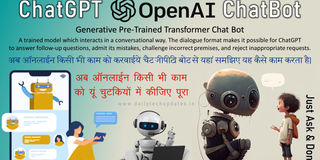Prime
ChatGPT: AI chatbot gets mixed reviews in Uganda

ChatGPT (Chat Generative Pre-trained Transformer), is a tool that allows users to enter written prompts to receive human-like responses in text format. PHOTO/ COURTESY
What you need to know:
- A number of Ugandan users, however, find the chatbot to be overly complex and difficult to navigate, leading to frustration and a feeling of being overwhelmed.
In recent years, artificial intelligence (AI) has made significant strides in revolutionising the way we interact with technology.
The latest example is ChatGPT (Chat Generative Pre-trained Transformer), a tool that allows users to enter written prompts to receive human-like responses in text format.
“I told ChatGPT I was bored. It offered to help if only I suggested a way out. I told it we should play a game, ‘this or that’ where both parties suggest two words and the other picks what is more preferable—the game was interesting, it was natural except for the writing part, but how does it even think?” Ms Melanie Nabukwasi, a communications practitioner, observed.
Trained by Reinforcement Learning from Human Feedback (RLHF), and on a dataset of 300 billion words, the result took just five days off ChatGPT’s inception in December 2022 to hit a one million user base. For context, Instagram pulled off the same number in two months, whilst Facebook needed 10 months.
“There is a lot more demand for ChatGPT than we expected. We are working to add more capacity,” tweeted Mr Sam Altman, ChatGPT’s chief executive officer, on December 1, 2022.
It is now reportedly running over a hundred million subscribers, with over 10 million queries per day. Yet as impressive as the numbers are, Ugandans who have used ChatGPT say it is foolhardy to expect it to entirely wave a magic wand.
Case by case basis
Ms Nabukwasi told this publication that ChatGPT is good as long as you use its response as a “sketch” of what you really want.
“Any sane person should fine-tune the responses. Short of that, you are misled,” she says.
In fact, Mr Altman tweeted on December 11, 2022, that while “ChatGPT is incredibly limited”; it is “good enough at some things to create a misleading impression of greatness,” he said, adding, “Prescriptively, it’s a mistake to be relying on it for anything important right now.”
The software’s maker, OpenAI, a San Francisco-based AI research and deployment company, envisioned the tool as a valuable resource for a wide range of applications from customer service to content creation.
It declared thus: “Our mission is to ensure artificial general intelligence benefits all of humanity.”
Inconsistencies
ChatGPT is not always consistent in its responses, which can lead to confusion and a lack of trust in its outputs.
“You must be good at AI written prompts for you to receive somewhat accurate responses, or else be prepared for different confusing feedback,” noted Mr Kasango.
This is particularly problematic for applications where accuracy is crucial, such as customer service or content creation.
“Whereas it can write for you a short script for a commercial video, its style is constant; you have to revisit your prowess in order to do what satisfies your individual clients, which this AI cannot understand,” says Mr Andrew Bugembe, a videography intern at the Communications Department of UCU.
Using ChatGPT
ChatGPT is trained on a large corpus of text and can provide incorrect information if the data it was trained on is outdated or incorrect. This could lead to users relying on false information and making decisions based on it.
“You will not get the facts right except for the lengthy paragraphs that shadow its inabilities.”
Improving user experience
Despite these challenges, OpenAI remains committed to improving the user experience of ChatGPT. The company has been working on developing more intuitive interfaces and improving the chatbot’s ability to understand and respond to user inputs.
“I should credit ChatGPT. It tops on feedback accuracy—only in comparison to other software in its league,” notes Mr Kasango.
Conclusively, ChatGPT has the potential to be a valuable resource for AI enthusiasts and professionals alike.
“Its complexity and inconsistent responses can make it hard for lazy prompt writers to get stuff out of it, but OpenAI’s efforts to address these challenges are commendable … we wait for what its future holds,” Mr Kasango concludes.
Complex, confusing
A number of Ugandan users, however, find the chatbot to be overly complex and difficult to navigate, leading to frustration and a feeling of being overwhelmed.
“It looks like the makers of ChatGPT targeted only Americans as their audience because the English diction it uses in response to prompts is verbose and more native compared to us Africans who use the language secondly,” Mr Junior Yasiri Kasango, a news editor of the Uganda Christian University (UCU)’s The Standard Digital publication, said.
One of the main issues is that ChatGPT is not user-friendly for those without a background in AI or prompt-based technology.
“This is typical of most Ugandans, who find it hard to search for content on Google,” observed Kasango, adding that ChatGPT—a more complex maze—will prove to be a more lofty hurdle.
Additionally, some say the tool’s interface can be confusing, and its outputs can be hard to understand, particularly for those who are not familiar with the technical jargon associated with AI.
“Ugandans are still asking for links in order to access certain content … As a result, many users are finding it challenging to use ChatGPT to achieve their desired outcomes. It cannot write a detailed essay, even worse, you will not have localised examples attached to that essay – the thing is overhyped,” a Makerere University law student, who spoke on condition of anonymity, said.




